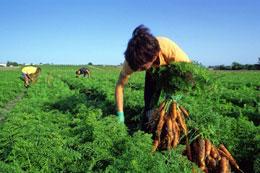Foreign workers needed to fight COVID-19 virus

By Mata Press Service
Canada has announced a series of new rules to ease the entry of immigrants, foreign workers and international students, enabling them to contribute in the nation’s battle against the COVID-19 virus.
"Immigrants, temporary foreign workers and international students are making considerable contributions to Canada's response to the unprecedented challenge that COVID-19 poses,” said Marco Mendicino, Minister of Immigration, Refugees and Citizenship.
“We know and value their efforts and sacrifices to keep Canadians healthy and ensure the delivery of critical goods and services,” he said.
Among the new policies is one that will allow Canadian businesses to recruit the workers they need and help unemployed workers contribute to the Canadian economy during this pandemic.
Effective immediately, a new, temporary policy will drastically reduce the time it takes for a temporary foreign worker to start a new job, Immigration Canada (IRCC) said in a statement.
While this policy is in place, a worker who is already in Canada and has secured a new job offer, typically backed by a labour market test, can get approval to start working in their new job, even while their work permit application is being fully processed. This will cut what can often take 10 weeks or more, down to 10 days or less.
IRCC said while Canadians are encouraged to fill job vacancies in critical sectors, a lack of workers in agriculture, food processing or health care could harm Canada's food security and health-care service capacity.
To be eligible under this new policy, workers must be in Canada with valid status; have an employer-specific work permit or have been working under a work permit exemption and
have submitted an application for a new work permit with a valid job offer under either the Temporary Foreign Worker Program or the International Mobility Program.
"Temporary foreign workers are an integral part of the Canadian workforce and Canada's COVID-19 response. They are helping us meet urgent labour needs, to ensure our food security and deliver essential goods and services,” said Carla Qualtrough, Minister of Employment, Workforce Development and Disability Inclusion.
“While there will always be jobs for Canadians who choose to work in these sectors, these changes help support our economy by ensuring that temporary foreign workers already here can contribute during these extraordinary times," she said.
In 2019, almost 190,000 employer-specific work permits were issued to foreign nationals.
To help battle the COVID-19 outbreak, starting immediately, the government will also remove the restriction that allows international students to work a maximum of 20 hours per week while classes are in session, provided they are working in an essential service or function, such as health care, critical infrastructure, or the supply of food or other critical goods.
For instance, thousands of international students are studying in health- and emergency service-related programs, including many who are nearly fully trained and ready to graduate. This temporary rule change provides health-care facilities with access to additional well-trained workers at a time when they are badly needed.
This temporary rule change will be in place until August 31, 2020.
Statistics Canada reported that in 2017–2018, more than 11,000 international students were enrolled in health-care programs at Canada's universities and colleges, representing about 4% of health-care students at that time.
In addition, IRCC has also announced a three-year Agri-Food Pilot to test an industry-specific approach to help employers in the meat processing, mushroom and greenhouse production, and livestock-raising industries.
It is aimed to assess and fill ongoing labour needs for full-time, year-round employees and provide a pathway to permanent residence for many temporary foreign workers already in Canada.
A total of 2,750 applications will be accepted annually throughout the pilot, which applies primarily to people who are already in Canada. Existing travel restrictions continue to apply.
The Agri-Food Pilot complements Canada's existing suite of economic immigration programs, which includes the Atlantic Immigration Pilot, the Rural and Northern Immigration Pilot, the caregivers pilots, the Global Skills Strategy, a revitalized Express Entry and the Provincial Nominee Program.
“This pilot will help to ensure that employers in the agriculture and agri-food sector have much needed skills and labour so we can strengthen Canada's food security, grow our economy and improve living standards for all of Canada,” said IRCC.
"This pilot provides an important path to permanent residency to these experienced workers, whom we rely on to feed our country and help grow our economy," said Marie-Claude Bibeau, Minister of Agriculture and Agri-Food.
The agriculture and agri-food industry is an important contributor to Canada's economic growth and vitality, supporting 1 in 8 jobs across the country. In 2019, agricultural exports hit a new record, reaching $67 billion. The Agri-Food Pilot will accept applications from May 15, 2020, to May 14, 2023.
The role immigrant labour is playing to keep the country moving during the COVID-19 pandemic is proof of why robust immigration must continue in the aftermath, Mendicino said last Friday.
"We could not put food on the plate of Canadians at an affordable price without immigrants, we could not support our front-line workers without immigration...So it's vitally important that we continue to immigrate today in a manner that is safe and orderly and also to drive that future that we all believe will be underpinned by immigration as it has been in the past," he said in an interview with The Canadian Press.
Over the next three years, Canada’s immigration plan calls for the admission of 341,000 permanent residents in 2020, 351,000 in 2021 and 361,000 in 2022.









